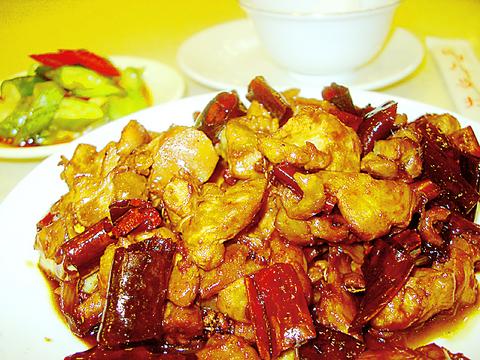For more than half a century, since it moved from Chengdu, Szechuan Province to Taipei, Chili House has been considered the most authentic place for Szechuan cuisine. It is a favorite of Taipei's gourmets and mainlanders who miss their hometown flavor.
It is also known for its very reasonable prices. Frequent guests include politicians John Chang (
You really can't say that you have been to Chili House if you haven't tried their trademark wontons in red chili oil (

PHOTO: YU SEN-LUN, TAIPEI TIMES
In fact, wonton in red oil is such a common snack that it is widely available in night markets. But the way it tastes at Chili House makes the dish stand out and makes Japanese tourists come all the way to taste the NT$55 dish.
Fragrant, spicy and hot are major tastes of Szechuan food. The secret lies in chili, pepper and the unique Szechuan pepper (
For variation, there are wontons in hot and sour oil (
Kung-pao chicken (
Other recommendations include sauteed eggplant with frog in chili sauce (

The primaries for this year’s nine-in-one local elections in November began early in this election cycle, starting last autumn. The local press has been full of tales of intrigue, betrayal, infighting and drama going back to the summer of 2024. This is not widely covered in the English-language press, and the nine-in-one elections are not well understood. The nine-in-one elections refer to the nine levels of local governments that go to the ballot, from the neighborhood and village borough chief level on up to the city mayor and county commissioner level. The main focus is on the 22 special municipality

The People’s Republic of China (PRC) invaded Vietnam in 1979, following a year of increasingly tense relations between the two states. Beijing viewed Vietnam’s close relations with Soviet Russia as a threat. One of the pretexts it used was the alleged mistreatment of the ethnic Chinese in Vietnam. Tension between the ethnic Chinese and governments in Vietnam had been ongoing for decades. The French used to play off the Vietnamese against the Chinese as a divide-and-rule strategy. The Saigon government in 1956 compelled all Vietnam-born Chinese to adopt Vietnamese citizenship. It also banned them from 11 trades they had previously

Jan. 12 to Jan. 18 At the start of an Indigenous heritage tour of Beitou District (北投) in Taipei, I was handed a sheet of paper titled Ritual Song for the Various Peoples of Tamsui (淡水各社祭祀歌). The lyrics were in Chinese with no literal meaning, accompanied by romanized pronunciation that sounded closer to Hoklo (commonly known as Taiwanese) than any Indigenous language. The translation explained that the song offered food and drink to one’s ancestors and wished for a bountiful harvest and deer hunting season. The program moved through sites related to the Ketagalan, a collective term for the

As devices from toys to cars get smarter, gadget makers are grappling with a shortage of memory needed for them to work. Dwindling supplies and soaring costs of Dynamic Random Access Memory (DRAM) that provides space for computers, smartphones and game consoles to run applications or multitask was a hot topic behind the scenes at the annual gadget extravaganza in Las Vegas. Once cheap and plentiful, DRAM — along with memory chips to simply store data — are in short supply because of the demand spikes from AI in everything from data centers to wearable devices. Samsung Electronics last week put out word